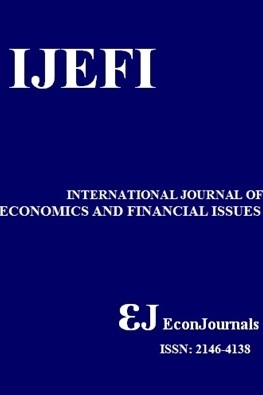Effectiveness of Foreign Exchange Market Intervention in Nigeria (1970-2013)
Effectiveness of Foreign Exchange Market Intervention in Nigeria (1970-2013)
Foreign Exchange Market, Nigeria, Exchange Rate,
- Başlangıç: 2011
- Yayıncı: İlhan ÖZTÜRK
Credit Rating Inflation during the 2000s: Lessons from the U.S. State Governments
Innovation Networks Modeling within the Concept of Open Innovations
İrina A. ZARAYCHENKO, Aleksey İ. SHİNKEVİCH, Mikhail Y. SHVETSOV, Klavdiya G. ERDYNEYEVA, Lidiya A. BORDONSKAYA, Aleksandra E. PERSİDSKAYA, Sofya A. ROZHKOVA, Aleksandr A. AFANASYEV
Commodity Channel Index: Evaluation of Trading Rule of Agricultural Commodities
Mansoor MAİTAH, Petr PROCHÁZKA, Michal CERMAK, Karel ŠRÉDL
GDP Development and Employment in Egypt (2000-2013)
Karel MALEC, Shereen GOUDA, Elena KUZMENKO, Daryoush SOLEİMANİ, Helena ŘEZBOVÁ, Petra ŠÁNOVÁ
Liana Holanda N. Nobre, John E. Grable, Wesley Vieira Da Silva, Claudimar Pereira Da Veiga
Formalization of Sustainable Innovative Development Process in the Model of Innovations Diffusion
Marina V. SHİNKEVİCH, Alexey İ. SHİNKEVİCH, Alexey D. CHUDNOVSKİY, İrina V. LUSHCHİK, Gulnara N. KAİGORODOVA, İzida İ. ISHMURADOVA, Svetlana A. BASHKİRTSEVA, Ludmila V. MARFİNA, Tatiana A. ZHURAVLEVA
Mohammad Salahuddin, Khorshed Alam, Lorelle Burton
Stock Market Response to Economic Growth and Interest Rate Volatility: Evidence from Nigeria
Babajide Abiola Ayopo, Lawal Adedoyin Isola, Somoye Russel Olukayode
Forecast of Employment in Switzerland: The Macroeconomic View
Mansoor Maitah, Daniel TOTH, Elena KUZMENKO, Karel ŠRÉDL, Helena ŘEZBOVÁ, Petra ŠÁNOVÁ
Does Dividend Announcement Generate Market Signal? Evidence from Pakistan
Ghulam Mujtaba Chaudhary, Shujahat Haider Hashmi, Aqeel Younis
